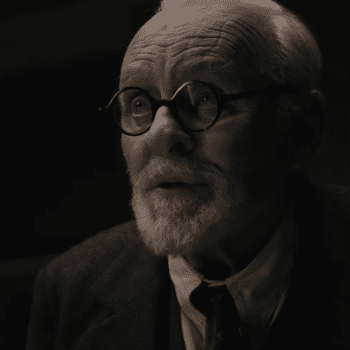Forget the ghosts of Christmases Past, Present and Future. The real inescapable spirit of the season is that of Charles Dickens himself.
Try as you might, you can’t run from Dickens’ A Christmas Carol during the holidays. It’s everywhere: His beloved story has been translated to film and television roughly a bazillion times, starring everyone from George C. Scott to Bill Murray to Mr. Magoo. We’ve heard the story so often that many of us might be able to quote whole passages from it. Ebenezer Scrooge, the story’s miserly protagonist, is as much a seasonal mascot as Santa Claus is.
But on Nov. 22, moviegoers will have a chance to see a very different telling of A Christmas Carol: Instead of diving into Dickens’ holiday classic, The Man Who Invented Christmas gives us an inkling of how the story itself came to be. Dickens’ characters come to imaginative life as the young Victorian-era writer sets words to paper. The following clip—newly released—gives you an idea of what to expect:
It’s a fun, poignant, imaginative story—even if the movie’s title is a little misleading. Dickens didn’t “invent” Christmas. Most of you reading are pretty familiar with the holiday’s real founder. He didn’t even create most of the flotsam we associate with Christmas: the trees, the stockings, the carols and so forth.
But Dickens’ contributions to the holiday are incredibly significant.
Christmas was, obviously, a thing long before Dickens. But Christ’s birth was falling out of favor by early 19th century England—so much so that writer Leigh Hunt described it as something “scarcely worth mention.” According to The Dickens Project at the University of California/Santa Cruz, Christmas was still popular with the lower classes. But for England’s upper crust, it was seen as a little uncouth, a little passé. Like Tyler Perry movies, maybe, or Nickelback.
In the movie, one of Dickens’ own publishers is skeptical of the appeal of a Christmas story.
“Does anybody ever really celebrate it anymore, apart from our clerk who never misses an opportunity to take a day off?” he blusters. “With pay?”
For Dickens, Scrooge wasn’t just a solitary old humbug: He was a fearsome future where fun and festivals were seen as frivolous, meaningless distractions—where making merry was replaced with making money.
But Dickens saw merit in the sometimes boisterous holiday, and as such he recast Christmas in ways that profoundly shape how we feel about it and celebrate it even today. Take a look at these three key ways in which Dickens helped shape how we think about Christmas:













